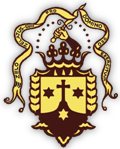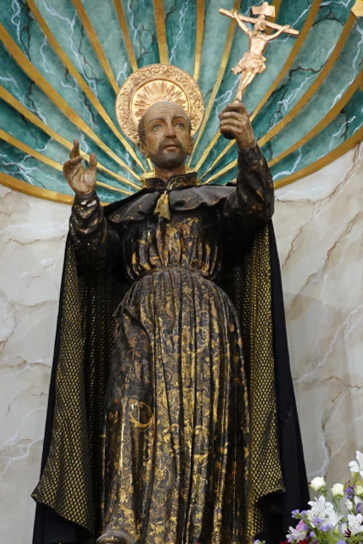
Messages given by Saint Ignatius of Loyola to Clemente Domínguez y Gómez, today Pope Saint Gregory XVII, the Very Great
 Saint Ignatius of Loyola
Saint Ignatius of Loyola
“My dearest Carmelite of the Holy Face sons, and also continuators of mine, since it is your task to fight against present-day heresies. You have also received the sacred deposit of the Jesuits; since the majority of those who still continue to call themselves Jesuits or Company (Society) of Jesus have apostatized; they are destroying my Work. In you, then, I place my confidence, for the confusion of the proud. For the confusion of the wise and prudent, the Order of Carmelites of the Holy Face is also the Company of Jesus. For Jesus’ true companions are those who make reparation to His Holy Face. It is not just by chance that the same Angel who directed me now directs your Founder and Father General.
Do not forget that you are in the place of my conversion. You should meditate deeply on this. Conversion should be the cross to guide you in your lives. Authentic conversion is necessary, renunciation of the world. Leave everything for love of Christ. For this great work you can count on my help, invoking me frequently as one of your Patrons.
Observe the Company of Jesus as she was years ago. They were always the best prepared, the best spiritual directors. Always very well-mannered, and always persecuted by society, counting the freemasons among their ferocious enemies. Nowadays, in contrast, the Company of Jesus has friends everywhere; because freemasons have infiltrated her, beginning with that traitor, the present Prepositor Father General, Father Arrupe, who is annihilating the Order; who has very good relations with the Iron Curtain countries. In your reading, works by the Company of Jesus should have a place of preference, since you are their continuators.
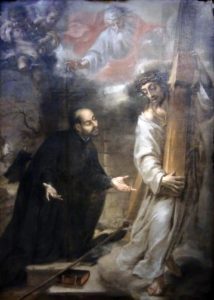 By indication of His Divine Majesty, Our Lord Jesus Christ, in the Order of the Holy Face, there should be an obligatory rule to read part of the Messages of El Palmar given to your Founder and Father General, every day.
By indication of His Divine Majesty, Our Lord Jesus Christ, in the Order of the Holy Face, there should be an obligatory rule to read part of the Messages of El Palmar given to your Founder and Father General, every day.
It is a shame that you waste time reading other Apparitions, sometimes dubious ones, and are unaware of the mystical grandeur of your Founder; who, though he has many defects and imperfections, lives on a very high mystical plane. He can be counted among the number of mystics who have received the greatest graces. It is a shame that you live close to him and do not learn. In every Religious Order they have always meditated on the life of their Founder. Think! Meditate! What apparition is there as transcendent as this one of El Palmar de Troya? You will not find one anywhere. Only the Life of Christ, in the Holy Land, surpasses this Work of El Palmar.
I promise you my continual intercession before the Throne of the Most Holy Virgin Mary for the wellbeing and prosperity of the Order of Carmelites of the Holy Face; also called Crossbearers, and as well Company of Jesus. Invoke me and you will experience my help as Patron. I bless you.”

Saint Ignatius of Loyola
“My dearest Carmelite of the Holy Face sons, and also continuators of mine, since it is your task to fight against present-day heresies. You have also received the sacred deposit of the Jesuits; since the majority of those who still continue to call themselves Jesuits or Company (Society) of Jesus have apostatized; they are destroying my Work. In you, then, I place my confidence, for the confusion of the proud. For the confusion of the wise and prudent, the Order of Carmelites of the Holy Face is also the Company of Jesus. For Jesus’ true companions are those who make reparation to His Holy Face. It is not just by chance that the same Angel who directed me now directs your Founder and Father General.
Do not forget that you are in the place of my conversion. You should meditate deeply on this. Conversion should be the cross to guide you in your lives. Authentic conversion is necessary, renunciation of the world. Leave everything for love of Christ. For this great work you can count on my help, invoking me frequently as one of your Patrons.
Observe the Company of Jesus as she was years ago. They were always the best prepared, the best spiritual directors. Always very well-mannered, and always persecuted by society, counting the freemasons among their ferocious enemies. Nowadays, in contrast, the Company of Jesus has friends everywhere; because freemasons have infiltrated her, beginning with that traitor, the present Prepositor Father General, Father Arrupe, who is annihilating the Order; who has very good relations with the Iron Curtain countries. In your reading, works by the Company of Jesus should have a place of preference, since you are their continuators.

By indication of His Divine Majesty, Our Lord Jesus Christ, in the Order of the Holy Face, there should be an obligatory rule to read part of the Messages of El Palmar given to your Founder and Father General, every day.
It is a shame that you waste time reading other Apparitions, sometimes dubious ones, and are unaware of the mystical grandeur of your Founder; who, though he has many defects and imperfections, lives on a very high mystical plane. He can be counted among the number of mystics who have received the greatest graces. It is a shame that you live close to him and do not learn. In every Religious Order they have always meditated on the life of their Founder. Think! Meditate! What apparition is there as transcendent as this one of El Palmar de Troya? You will not find one anywhere. Only the Life of Christ, in the Holy Land, surpasses this Work of El Palmar.
I promise you my continual intercession before the Throne of the Most Holy Virgin Mary for the wellbeing and prosperity of the Order of Carmelites of the Holy Face; also called Crossbearers, and as well Company of Jesus. Invoke me and you will experience my help as Patron. I bless you.”
Biography of Saint Ignatius of Loyola
31st of July
 Presbyter. Religioso. Founder. Patriarch. Doctor. Great Mystic. Protector of the Carmelites of the Holy Face.
Presbyter. Religioso. Founder. Patriarch. Doctor. Great Mystic. Protector of the Carmelites of the Holy Face.
One of the great pillars of the Catholic Counter-Reformation in an age of great heresies and moral corruption, he was born in Loyola, Guipúzcoa, Spain, on the 25th of September in the year 1491 into the bosom of a noble family. He was the last of the thirteen children born to Beltran Ibáñez de Oñaz y Loyola, and Marina Sánchez de Licona. He had a deeply Catholic upbringing. His impassioned youth, together with longings for glory, caused him to lead a worldly life. He had a sturdy and valiant character, very ready to undertake great things, and was clever and prudent.
In 1517 he took up a military career, and entered the service of the viceroy of Navarre, Duke of Nájera, and distinguished himself for his valour and military skill. In the year 1521 he fought against the French when they invaded Navarre to wrest it from the Spanish crown, and in the defence of Pamplona was wounded in the leg by enemy troops, completely routed by the Spanish forces. As consequence of the wound, he had to undergo very painful treatment, for the bones had set badly and had to be put back in place, without him saying a word or giving any other sign of pain other than tightly clenching his fists. To leave the legs equal, he had the bone shortened. To do this they wanted to tie him down, but he refused. Then they had to stretch the leg on a kind of trestle or rack. The consequences of this providential wound were transcendent for him. During his convalescence, the reading of ascetic books and biographies of saints, and his response to God’s graces, moved him to change his ideals, and give himself up to the service of Christ and the Church. He said: “Saint Francis did this, so I have to do it. Saint Dominic did this, so I have to do it as well.”
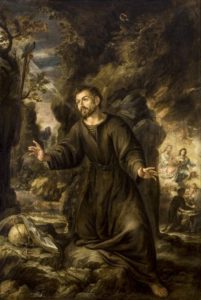 A man of iron character and indomitable will, in 1522, scarcely recovered, he went on pilgrimage to the sanctuary of Montserrat in Barcelona, where he exchanged his gentleman’s dress for a pilgrim’s smock of sackcloth, and swore to consecrate his life to the exaltation of Catholicism. Afterwards he retired to a cave in the nearby town of Manresa, giving himself up to long hours of prayer and rigorous penance. Then, following a brief stay in Rome, Italy, he set sail for the Holy Land, reaching Jerusalem in September of the same year 1522. There he made known to the Franciscans his desire to found an association which, spread throughout the world, might counteract impiety and heresy. The Franciscans treated him coldly, and even forbade him to stay in Jerusalem. On his return to Spain in 1524, he began ecclesiastical studies in order to be ordained Priest. Following two years of Latin studies in Barcelona, in 1526 he headed for the University of Alcalá de Henares, Madrid, where he began his philosophical studies. While he was studying in Alcalá de Henares, they suspected him of belonging to the fanatical illuminati, who, engulfed in supposed divine revelations, sowed the most ridiculous errors. Denounced to the Holy Inquisition, he was tried and imprisoned for about two months. His innocence recognized, Saint Ignatius passed from Alcalá to the University of Salamanca to continue his studies, where he was also accused, tried, and imprisoned for a further twenty-two days. Absolved by the Church authorities, he left that University and headed for that of the Sorbonne in Paris, France, where he was also accused of being a secret heretic, tried and absolved. In the College of Saint Barbara in Paris University he completed his studies in philosophy and Theology, graduating in 1534. In this college he shared a room with two student companions: Saint Francis Xavier and Saint Peter Faber.
A man of iron character and indomitable will, in 1522, scarcely recovered, he went on pilgrimage to the sanctuary of Montserrat in Barcelona, where he exchanged his gentleman’s dress for a pilgrim’s smock of sackcloth, and swore to consecrate his life to the exaltation of Catholicism. Afterwards he retired to a cave in the nearby town of Manresa, giving himself up to long hours of prayer and rigorous penance. Then, following a brief stay in Rome, Italy, he set sail for the Holy Land, reaching Jerusalem in September of the same year 1522. There he made known to the Franciscans his desire to found an association which, spread throughout the world, might counteract impiety and heresy. The Franciscans treated him coldly, and even forbade him to stay in Jerusalem. On his return to Spain in 1524, he began ecclesiastical studies in order to be ordained Priest. Following two years of Latin studies in Barcelona, in 1526 he headed for the University of Alcalá de Henares, Madrid, where he began his philosophical studies. While he was studying in Alcalá de Henares, they suspected him of belonging to the fanatical illuminati, who, engulfed in supposed divine revelations, sowed the most ridiculous errors. Denounced to the Holy Inquisition, he was tried and imprisoned for about two months. His innocence recognized, Saint Ignatius passed from Alcalá to the University of Salamanca to continue his studies, where he was also accused, tried, and imprisoned for a further twenty-two days. Absolved by the Church authorities, he left that University and headed for that of the Sorbonne in Paris, France, where he was also accused of being a secret heretic, tried and absolved. In the College of Saint Barbara in Paris University he completed his studies in philosophy and Theology, graduating in 1534. In this college he shared a room with two student companions: Saint Francis Xavier and Saint Peter Faber.
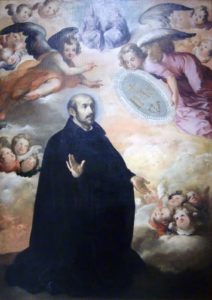 In Paris he eventually gathered about himself six companions, who formed the nucleus of the association he had been dreaming of for some time. They were: the Spaniard Saint Francis Xavier, the Savoyan Saint Peter Faber, the Spaniards Saint Diego Laínez, Alphonse Salmerón and Nicholas Bobadilla, and the Portuguese Simon Rodríguez. On the 15th of August 1534, in a chapel on Montmartre, they took vows of poverty and chastity, to which they added that of going to Jerusalem to spend themselves in the conversion of the heathen. To do so they were to wait one year in Venice for the embarkation, and if the occasion did not materialize, they were to place themselves under the Pope’s orders, for Saint Ignatius’ preferred virtue was obedience.
In Paris he eventually gathered about himself six companions, who formed the nucleus of the association he had been dreaming of for some time. They were: the Spaniard Saint Francis Xavier, the Savoyan Saint Peter Faber, the Spaniards Saint Diego Laínez, Alphonse Salmerón and Nicholas Bobadilla, and the Portuguese Simon Rodríguez. On the 15th of August 1534, in a chapel on Montmartre, they took vows of poverty and chastity, to which they added that of going to Jerusalem to spend themselves in the conversion of the heathen. To do so they were to wait one year in Venice for the embarkation, and if the occasion did not materialize, they were to place themselves under the Pope’s orders, for Saint Ignatius’ preferred virtue was obedience.
By January 1537 they found themselves in Venice; but given the war between this republic and the Turks, they were unable to take ship, so they headed for Rome to place themselves at the disposition of the Roman Pontiff, at the time Saint Paul III the Great. During their stay in Italy, the number of companions increased. Christ inspired Saint Ignatius with the idea of transforming the association into a religious institution, and he decided to work for its approval. He was ordained Priest in 1537. Towards the middle of 1538, the association took the name of Company of Jesus. Pope Saint Paul III gave his approbation to the new Religious Order on the 27th of September 1540, the official date of the foundation of the Company of Jesus, and Saint Ignatius was proclaimed General of the new Order in 1541. Besides the third vow of obedience, indispensable in religious life, Saint Ignatius added a fourth vow: that of absolute obedience to the Sovereign Pontiff in any work the Pope might wish to commend to them, so that the Jesuits became soldiers at the service of the Pope. Their way of life was that of regular clerics, but with different emphases in the way of doing apostolic work. Soon the saintly Founder sent his sons out to work among the faithful, and also in the conversion of the heathen, including under this last name, not only idolaters and muslims, but all those who were separating from Catholicism.
 Saint Ignatius excluded Church dignities from his sons, only allowing them when expressly ordered by the Pope. The labour of the Company of Jesus was extraordinary, not only in Europe, but also in China, Japan, India, the Spanish colonies in America, and so forth. His apostolic and educational work had enormous repercussions, and was an efficacious instrument in the hands of the Church for carrying out the true reform, the containment of protestantism and the reconquest of some of the territories invaded by heresy. With the foundation of the Company of Jesus, Saint Ignatius contributed to Catholic Reform with two vital elements: a hardy spirituality and a Christian education. The principal object of the Company was the greater glory of God, to which they were to aspire by way of personal sanctification and that of their neighbour.
Saint Ignatius excluded Church dignities from his sons, only allowing them when expressly ordered by the Pope. The labour of the Company of Jesus was extraordinary, not only in Europe, but also in China, Japan, India, the Spanish colonies in America, and so forth. His apostolic and educational work had enormous repercussions, and was an efficacious instrument in the hands of the Church for carrying out the true reform, the containment of protestantism and the reconquest of some of the territories invaded by heresy. With the foundation of the Company of Jesus, Saint Ignatius contributed to Catholic Reform with two vital elements: a hardy spirituality and a Christian education. The principal object of the Company was the greater glory of God, to which they were to aspire by way of personal sanctification and that of their neighbour.
Saint Ignatius of Loyola died in Rome on the 31st of July 1556. He was beatified by Pope Saint Paul V the Great on the 17th of July 1609.
Canonized by Pope Saint Gregory XV the Great on the 12th of March 1622. Declared Doctor of the Church by Pope Saint Gregory XVII the Very Great on the 3rd of October 1978.

Presbyter. Religioso. Founder. Patriarch. Doctor. Great Mystic. Protector of the Carmelites of the Holy Face.
One of the great pillars of the Catholic Counter-Reformation in an age of great heresies and moral corruption, he was born in Loyola, Guipúzcoa, Spain, on the 25th of September in the year 1491 into the bosom of a noble family. He was the last of the thirteen children born to Beltran Ibáñez de Oñaz y Loyola, and Marina Sánchez de Licona. He had a deeply Catholic upbringing. His impassioned youth, together with longings for glory, caused him to lead a worldly life. He had a sturdy and valiant character, very ready to undertake great things, and was clever and prudent.
In 1517 he took up a military career, and entered the service of the viceroy of Navarre, Duke of Nájera, and distinguished himself for his valour and military skill. In the year 1521 he fought against the French when they invaded Navarre to wrest it from the Spanish crown, and in the defence of Pamplona was wounded in the leg by enemy troops, completely routed by the Spanish forces. As consequence of the wound, he had to undergo very painful treatment, for the bones had set badly and had to be put back in place, without him saying a word or giving any other sign of pain other than tightly clenching his fists. To leave the legs equal, he had the bone shortened. To do this they wanted to tie him down, but he refused. Then they had to stretch the leg on a kind of trestle or rack. The consequences of this providential wound were transcendent for him. During his convalescence, the reading of ascetic books and biographies of saints, and his response to God’s graces, moved him to change his ideals, and give himself up to the service of Christ and the Church. He said: “Saint Francis did this, so I have to do it. Saint Dominic did this, so I have to do it as well.”

A man of iron character and indomitable will, in 1522, scarcely recovered, he went on pilgrimage to the sanctuary of Montserrat in Barcelona, where he exchanged his gentleman’s dress for a pilgrim’s smock of sackcloth, and swore to consecrate his life to the exaltation of Catholicism. Afterwards he retired to a cave in the nearby town of Manresa, giving himself up to long hours of prayer and rigorous penance. Then, following a brief stay in Rome, Italy, he set sail for the Holy Land, reaching Jerusalem in September of the same year 1522. There he made known to the Franciscans his desire to found an association which, spread throughout the world, might counteract impiety and heresy. The Franciscans treated him coldly, and even forbade him to stay in Jerusalem. On his return to Spain in 1524, he began ecclesiastical studies in order to be ordained Priest. Following two years of Latin studies in Barcelona, in 1526 he headed for the University of Alcalá de Henares, Madrid, where he began his philosophical studies. While he was studying in Alcalá de Henares, they suspected him of belonging to the fanatical illuminati, who, engulfed in supposed divine revelations, sowed the most ridiculous errors. Denounced to the Holy Inquisition, he was tried and imprisoned for about two months. His innocence recognized, Saint Ignatius passed from Alcalá to the University of Salamanca to continue his studies, where he was also accused, tried, and imprisoned for a further twenty-two days. Absolved by the Church authorities, he left that University and headed for that of the Sorbonne in Paris, France, where he was also accused of being a secret heretic, tried and absolved. In the College of Saint Barbara in Paris University he completed his studies in philosophy and Theology, graduating in 1534. In this college he shared a room with two student companions: Saint Francis Xavier and Saint Peter Faber.

In Paris he eventually gathered about himself six companions, who formed the nucleus of the association he had been dreaming of for some time. They were: the Spaniard Saint Francis Xavier, the Savoyan Saint Peter Faber, the Spaniards Saint Diego Laínez, Alphonse Salmerón and Nicholas Bobadilla, and the Portuguese Simon Rodríguez. On the 15th of August 1534, in a chapel on Montmartre, they took vows of poverty and chastity, to which they added that of going to Jerusalem to spend themselves in the conversion of the heathen. To do so they were to wait one year in Venice for the embarkation, and if the occasion did not materialize, they were to place themselves under the Pope’s orders, for Saint Ignatius’ preferred virtue was obedience.
By January 1537 they found themselves in Venice; but given the war between this republic and the Turks, they were unable to take ship, so they headed for Rome to place themselves at the disposition of the Roman Pontiff, at the time Saint Paul III the Great. During their stay in Italy, the number of companions increased. Christ inspired Saint Ignatius with the idea of transforming the association into a religious institution, and he decided to work for its approval. He was ordained Priest in 1537. Towards the middle of 1538, the association took the name of Company of Jesus. Pope Saint Paul III gave his approbation to the new Religious Order on the 27th of September 1540, the official date of the foundation of the Company of Jesus, and Saint Ignatius was proclaimed General of the new Order in 1541. Besides the third vow of obedience, indispensable in religious life, Saint Ignatius added a fourth vow: that of absolute obedience to the Sovereign Pontiff in any work the Pope might wish to commend to them, so that the Jesuits became soldiers at the service of the Pope. Their way of life was that of regular clerics, but with different emphases in the way of doing apostolic work. Soon the saintly Founder sent his sons out to work among the faithful, and also in the conversion of the heathen, including under this last name, not only idolaters and muslims, but all those who were separating from Catholicism.

Saint Ignatius excluded Church dignities from his sons, only allowing them when expressly ordered by the Pope. The labour of the Company of Jesus was extraordinary, not only in Europe, but also in China, Japan, India, the Spanish colonies in America, and so forth. His apostolic and educational work had enormous repercussions, and was an efficacious instrument in the hands of the Church for carrying out the true reform, the containment of protestantism and the reconquest of some of the territories invaded by heresy. With the foundation of the Company of Jesus, Saint Ignatius contributed to Catholic Reform with two vital elements: a hardy spirituality and a Christian education. The principal object of the Company was the greater glory of God, to which they were to aspire by way of personal sanctification and that of their neighbour.
Saint Ignatius of Loyola died in Rome on the 31st of July 1556. He was beatified by Pope Saint Paul V the Great on the 17th of July 1609.
Canonized by Pope Saint Gregory XV the Great on the 12th of March 1622. Declared Doctor of the Church by Pope Saint Gregory XVII the Very Great on the 3rd of October 1978.
